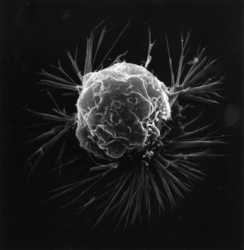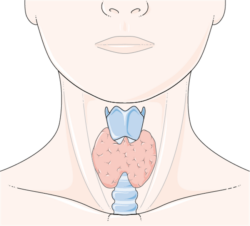Women who undergo chemotherapy for any cancer often face infertility due to premature ovarian failure. The chemo drugs themselves deplete ovarian follicles and granulosa cells gradually leading to what is called chemotherapy induced amenorrhea (CIA). The only strategy currently available to maintain a modicum of fertility is oocyte or embryo cytopreservation, extracting and freezing the eggs alone or fertilized for later use. While encouraging, this is not an option for many women, especially younger women.
Researchers in Italy may have identified another method for preserving fertility post chemotherapy. They hypothesized that if they could protect the granulosa cells, those cells that control follicle (egg) maturation and hormone production, from chemotherapy induced apoptosis (cell death), then perhaps fertility could be protected post chemotherapy. Through a series of experiments, they found that the thyroid hormone, triiodothyronine or T3 prevented chemo induced cell death via multiple mechanisms.
Study Details – T3 and Ovarian Granulosa Cell Survival
Ovarian cells from female rats were extracted and cultured in media that contained the chemotherapeutic drug paclitaxel (PTX) alone, plus vehicle or PTX plus T3. Post extraction and pre-exposure, the cells were evaluated to ensure the extraction process did not alter normal steroidogenic pathways and to confirm the presence of all the appropriate thyroid hormone machinery. Next, a series of tests were conducted to measure cell cycle activity with the different exposures. The researchers found that T3 prevented PTX induced cell death and allowed these cells to cycle normally. T3 blocked critical factors actively involved in PTX related cell death.
- T3 prevented PTX-induced cell-cycle arrest
- T3 downregulated PTX induced caspase 3 production – proteins involved in cell death
- T3 diminished PTX increased Bax levels – Bax genes induce apoptosis via mitochondrial permeability and other mechanisms
What This Means
Thyroid hormones regulate each of the fundamental processes associated with cell proliferation, differentiation and cell death in virtually all tissues. That they would be involved in preventing cell death relative to chemotherapy is not surprising. That the thyroid hormone machinery is present in ovarian granulosa cells is also not surprising. What is surprising is that we are have only recently begun to look towards these endogenous ligands and hormones systems as therapeutic options for disease.
T3 is a proliferative hormone, known for initiating and maintaining growth processes in tissues. In hepatocytes, the liver cells, T3 protects against apoptosis via both genomic and non-genomic mechanisms. In the pancreas, T3 promotes survival of the beta-cells in diabetic induced apopotosis. In the heart, thyroid hormones regulate rhythm and other processes. We see diminished T3 in cases of multiple sclerosis and other axon degenerating diseases. Researchers have shown that when T3 is added back, the disease state shifts from one of progressive demyelination towards a pattern of remyelination, regrowth and ultimately healing. Since at least 13% of diabetics also have hypothyroid conditions, where pancreatic beta cells are destroyed and peripheral neuropathies are common, T3 could be a viable treatment option here as well. It would protect not only pancreatic health but heal the peripheral neuropathy and perhaps even control the progression of the associated heart disease.
T3 and Common Women’s Health Conditions
Where disorders of reproduction are concerned, the role of T3 is less clear. In the present study, we see evidence that T3 exerts a protective and pro-survival effect on the granulosa cells. Should we expect, given its pro-survival role in other tissues that T3 would be involved in regulating cell survival in the non-beneficial tissues as well, such as fibroids, endometriotic and adenomyotic growths, and ovarian and other cysts? Since T3 is functionally pro-survival would this mean that the abnormal tissue growth seen in common women’s health conditions is linked to too much T3? Maybe not.
With polycystic ovarian syndrome (PCOS) correcting hypothyroidism was associated with a regression of ovarian cysts and a reduction of androgenic hormones, suggesting other hormones are also involved in tissue growth. This makes sense. Hormones operate in systems. It is never as simple as one hormone > one function or set of functions. The cells involved in reproductive tissues come in many forms, have many functions and are bathed in a veritable cocktail of many different hormones and other ligands, each controlling a myriad of processes.
From the research thus far, T3 prevents cell death in dying tissues. It is not clear whether it would initiate the same pro-survival mechanisms in non-dying or proliferating tissues. It is also not clear how T3 interacts in the presence of other hormones and other signals. What is clear is that many women suffer from hypothyroidism and also suffer from a slew of reproductive conditions that involve aberrant tissue growth. How the two are connected ought to be investigated more thoroughly.
We need your help.
Hormones Matter needs funding now. Our research funding was cut recently and because of our commitment to independent health research and journalism unbiased by commercial interests, we allow minimal advertising on the site. That means all funding must come from you, our readers. Don’t let Hormones Matter die.
Yes, I’d like to support Hormones Matter.
This post was published previously on Hormones Matter in March 2014.













